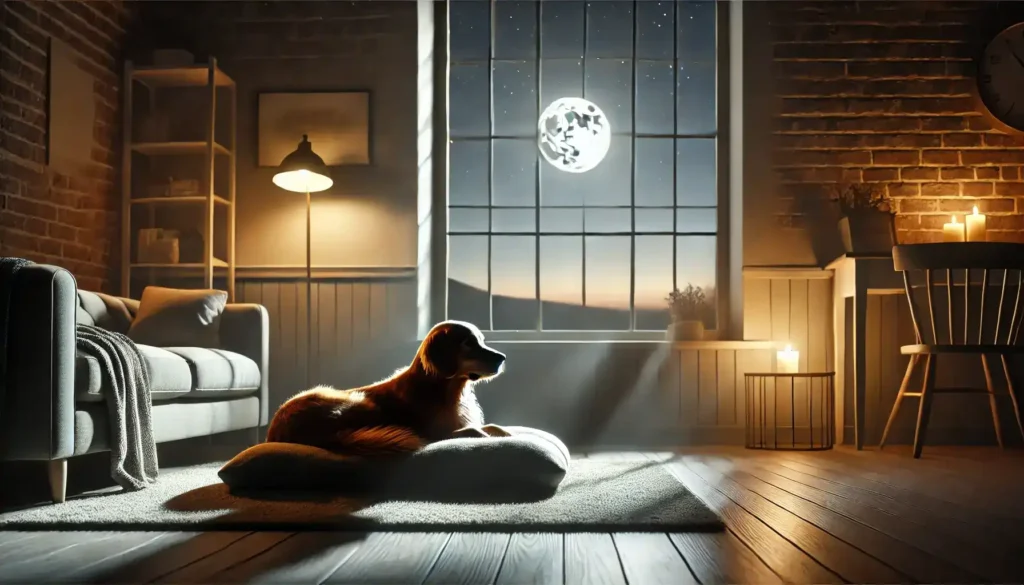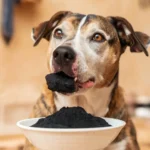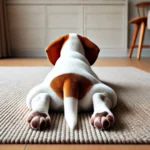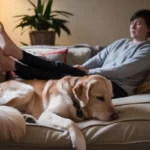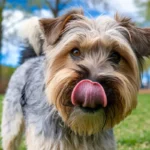Have you ever been startled awake by the sound of your furry friend panting heavily in the dark? If so, you’re certainly not alone. Many dog owners frequently find themselves pondering, “Why do dogs pant at night?” This common canine behavior can indeed be puzzling and sometimes concerning for pet parents. In this comprehensive guide, we’ll thoroughly explore the reasons behind nighttime panting in dogs, discuss when it might be a cause for alarm, and provide practical tips to ensure your four-legged companion’s comfort and well-being during the nighttime hours.
why do dogs pant at night : A Natural Cooling Mechanism
Before we delve into the specifics of why dogs pant at night, it’s crucial to understand the general purpose of panting in canines. Unlike humans, dogs don’t sweat through their skin; instead, they primarily rely on panting as their main method of regulating body temperature. When a dog pants, they’re essentially evaporating moisture from their tongue, nasal passages, and lungs, which effectively helps cool their body.
The Science Behind Canine Panting
Panting is undoubtedly a vital physiological process for dogs. As they inhale, the air passes over the moist surfaces of their mouth and respiratory tract. When this air is subsequently exhaled, it carries away excess heat, effectively cooling the dog’s body. This process is particularly important because dogs have limited sweat glands, mainly located in their paw pads, which aren’t sufficient for full-body temperature regulation.
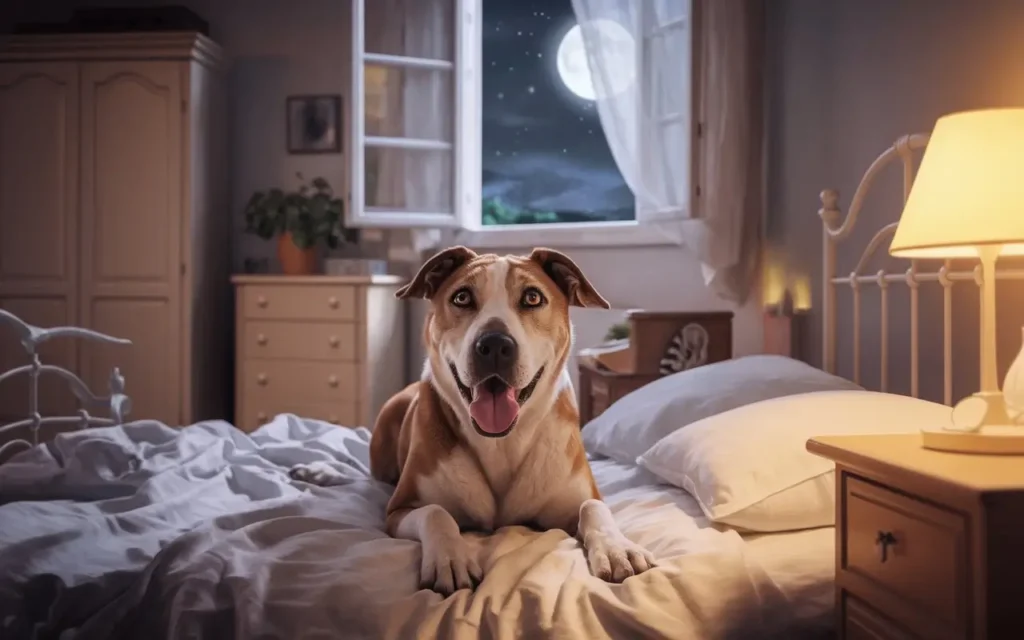
Common Reasons Why Dogs Pant at Night
Now that we’ve established the basic function of panting, let’s explore the specific reasons why dogs pant at night. These can range from normal behaviors to potential health concerns that may require attention.
1. Temperature Regulation: A Primary Cause
One of the most common reasons why dogs pant a lot at night is simply to cool down. If your home is warm or your dog has a thick coat, they may pant to regulate their body temperature, especially after settling down for sleep. This natural cooling mechanism is particularly important for dogs, as they can’t shed layers like humans can.
Tips for Managing Nighttime Temperature:
- Ensure proper ventilation in your dog’s sleeping area
- Consider using a fan or air conditioning if the room is particularly warm
- Provide a cooling mat or elevated bed to improve air circulation
2. Anxiety and Stress: Hidden Culprits
Dogs, much like humans, can experience anxiety and stress, which may manifest as excessive panting at night. This is particularly common in dogs with separation anxiety or those who are sensitive to environmental changes. Recognizing these signs is crucial for addressing the underlying issues causing your dog’s nighttime distress.
Signs of Nighttime Anxiety in Dogs:
- Restlessness and pacing
- Whining or barking
- Excessive panting
- Destructive behavior
If you suspect anxiety is the reason why your dog pants excessively at night, it’s advisable to consult with a veterinarian or a professional dog behaviorist for tailored advice and solutions.
3. Pain or Discomfort: Silent Sufferers
Sometimes, dogs pant heavily at night due to underlying pain or discomfort. This could be related to various health issues, including:
- Arthritis and joint pain
- Injuries or recent surgeries
- Digestive problems or bloating
- Dental issues or oral pain
If you notice your dog panting excessively at night along with other signs of distress, it’s crucial to seek veterinary attention promptly to rule out any serious medical concerns.
4. Age-Related Changes: The Senior Dog Dilemma
As dogs grow older, their bodies undergo various changes that can significantly affect their nighttime behavior. Many pet owners wonder why old dogs pant at night more frequently than their younger counterparts. This can be attributed to several factors:
- Decreased ability to regulate body temperature
- Cognitive dysfunction (similar to dementia in humans)
- Increased sensitivity to environmental changes
- Underlying health conditions more common in senior dogs
Supporting Older Dogs:
- Provide a comfortable, orthopedic bed to alleviate joint pain
- Maintain a consistent routine to reduce anxiety
- Keep the sleeping area quiet and calm to minimize disturbances
- Schedule regular vet check-ups to monitor age-related health changes
5. Dreams and Sleep Disturbances: Nocturnal Adventures
Just like humans, dogs experience different sleep stages, including REM (Rapid Eye Movement) sleep. During this stage, dogs may twitch, move their paws, or even pant as they dream. While this is generally normal, excessive or distressed panting during sleep could indicate a sleep disorder that requires attention.
When to Be Concerned: Excessive Nighttime Panting in Dogs
While some nighttime panting is normal, there are instances when it may signal a more serious issue. Here are some red flags to watch out for:
1. Sudden Onset of Excessive Panting
If your dog suddenly starts panting heavily at night without any apparent reason, it could be a sign of an underlying health problem. This is especially concerning if the panting is accompanied by other symptoms such as:
- Lethargy or unusual fatigue
- Loss of appetite or changes in eating habits
- Noticeable changes in behavior or temperament
- Difficulty breathing or shortness of breath
2. Persistent and Intense Panting
When dogs pant excessively at night for extended periods, it may indicate a more severe condition that requires immediate attention. Some potential causes include:
- Heart disease or cardiovascular issues
- Respiratory problems or lung diseases
- Cushing’s disease or hormonal imbalances
- Heatstroke (even if it’s not particularly hot in the environment)
3. Panting Accompanied by Unusual Behaviors
If your dog’s nighttime panting is coupled with any of the following behaviors, it’s time to consult a veterinarian without delay:
- Restlessness or inability to get comfortable
- Frequent position changes or difficulty settling
- Vomiting, diarrhea, or other digestive issues
- Excessive thirst or increased urination
Practical Tips to Address why do dogs pant at night
Now that we’ve explored why dogs pant at night and when it might be concerning, let’s discuss some practical steps you can take to ensure your furry friend’s comfort and well-being during nighttime hours.
1. Create a Comfortable Sleep Environment
Ensuring your dog has a cool, comfortable place to sleep can significantly reduce nighttime panting. Consider implementing the following:
- Choose a quiet, draft-free area for your dog’s bed
- Invest in a high-quality, supportive dog bed that suits their size and needs
- Use light, breathable bedding materials to prevent overheating
2. Establish a Consistent Bedtime Routine
Dogs thrive on routine, and a consistent bedtime schedule can help reduce anxiety and promote better sleep. Try incorporating the following:
- Establish a consistent bedtime routine and try to follow it diligently.
- Include calming activities like gentle play or brushing before bed
- Avoid exciting games or treats close to bedtime to prevent overstimulation
3. Provide Adequate Exercise During the Day
Providing your dog with adequate physical exercise and mental engagement throughout the day can promote more restful sleep. nights. However, it’s important to avoid intense exercise too close to bedtime, as this can cause overheating and increased panting.
4. Monitor Room Temperature
Keep a close eye on the temperature in your dog’s sleeping area. The ideal temperature for most dogs is between 65-75°F (18-24°C). Use fans or air conditioning, if needed, to keep the environment comfortable for a restful night.
5. Stay Hydrated
Always provide fresh, clean water for your dog, especially before bedtime. Proper hydration can help regulate body temperature and reduce the need for excessive panting during the night.
6. Regular Vet Check-ups
Regular veterinary check-ups allow for the early detection of potential health problems. This is particularly important for older dogs or those with a history of health problems that may contribute to nighttime panting.
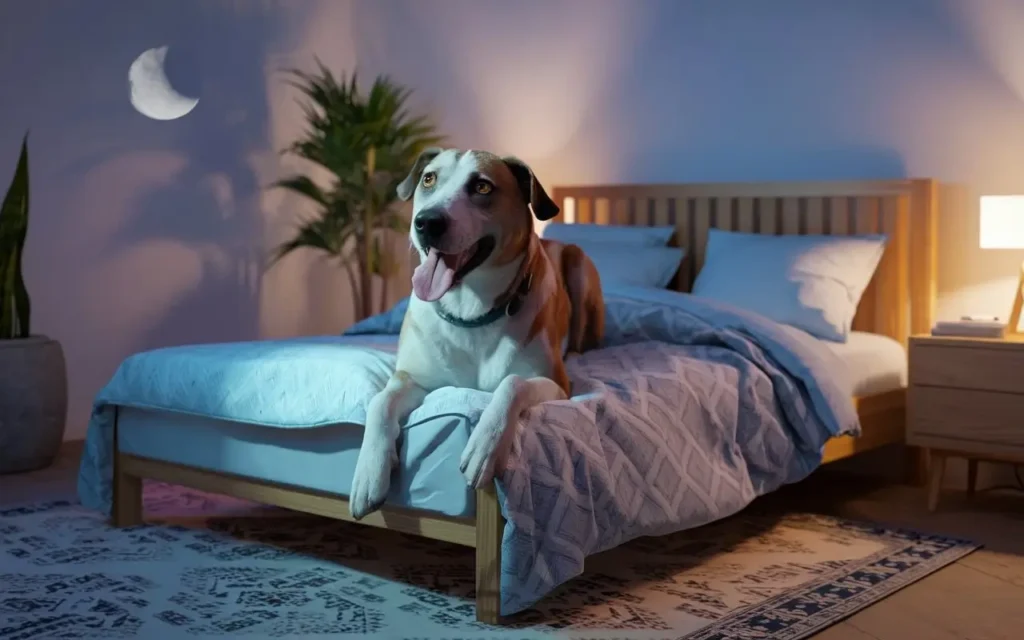
Understanding Breed-Specific Tendencies in Nighttime Panting
Fair enough to say, some breeds of dogs will pant harder even at night owing to their typical build. Brachycephalic breeds, including the Bulldog, the Pug, and the Boston Terrier, pant harder because of their foreshortened airways. Owning a breed of this type requires one to be particularly watchful regarding their night pattern of breathing and comfort.
The Role of Diet in Nighttime Panting
Believe it or not, your dog’s diet can be a huge influencer on their nighttime panting. A balanced, easily digestible diet can help prevent digestive discomfort that may lead to increased panting. Also, feeding your dog too close to bedtime will cause metabolism to increase along with body heat, causing more panting. Consider these dietary tips:
- Feed your dog at least a few hours before bedtime to allow for proper digestion
- Ensure the food is appropriate for your dog’s age, size, and activity level
- Consult with your vet about any specific dietary needs, especially for older dogs or those with health conditions that may affect their nighttime comfort
Conclusion: Ensuring Peaceful Nights for You and Your Canine Companion
Understanding why dogs pant at night is crucial for every pet owner who wants to ensure their furry friend’s well-being. While some nighttime panting is normal, being aware of excessive or unusual panting can help you identify potential health issues early. By creating a comfortable sleep environment, maintaining a consistent routine, and staying attuned to your dog’s needs, you can help ensure restful nights for both you and your beloved pet.
Therefore, you should not hesitate to consult an opinion with your veterinarian in case any change gives you a doubt about your dog’s nighttime panting behavior. They will be able to give you more personalized advice and help you eliminate other health issues that might be the source of these tiring moments which your dog undergoes.
Being proactive and watchful with the night regimen of your dog is important; it will not only make sure that he or she is comfortable, but you are further building their relationship between you and your loyal companion. You can help your dog enjoy peaceful nights, leading to a more pleasant and healthy day for both of you, with the right information and care.

